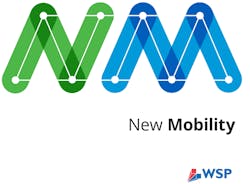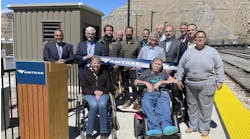WSP Canada Inc. was commissioned by Metrolinx to research and develop a major new study, "New Mobility", which examines the changing nature of mobility.
The term “new mobility” includes many forms of transportation arising from changing user needs and demands; from new and emerging technologies, such as mobile apps, and from transformative business models.
The “New Mobility” report identifies global and regional trends most important to new mobility in four key areas: transformative technologies, new government roles, user needs and desires, and urban form and the built environment. These include consideration of technology-driven increases in automation, connectivity and information sharing through the Internet of Things, automated vehicles and future proofing infrastructure.
The report imagines two different future scenarios and how they might unfold; one path sees strong government direction, while another considers a more organic, less deliberate process. From these scenarios, the report outlines potential impacts to government policy and operations and identifies strategic directions, organized into six themes to guide government action, including: Government Re-Imagined, New Mobility is the New Transit, The User is King, Driving the Cities We Want, All About the Data and Plan for the “Known Unknowns”.
Daniel Haufschild, WSP Vice-President, Urban Mobility|Transit Planning and Engineering, and Project Lead for the New Mobility report team, said, “New mobility is disruptive and uncomfortable for government. Public transport agencies are struggling to adapt and navigate this new uncertainty. The WSP New Mobility report identifies the first few steps to guide them in this transformation.”
Metrolinx commissioned WSP Canada Inc. to research and develop the report, which the company completed over a period of five months, drawing upon the diverse perspectives and experience of WSP’s global experts and a 28-member international Thought Leader Panel comprised of urban planning, transit, sustainability and environmental experts, mobility researchers, app developers and medical and health specialists from nine different countries.
WSP’s consulting team collaborated closely with Metrolinx’s advisors, led by Antoine Belaieff, Director of Regional Planning, and Lisa Salsberg, Sr. Manager of Systems Planning, throughout the process. More information on the Metrolinx’s regional transit plan is available here: http://www.masstransitmag.com/12257664

